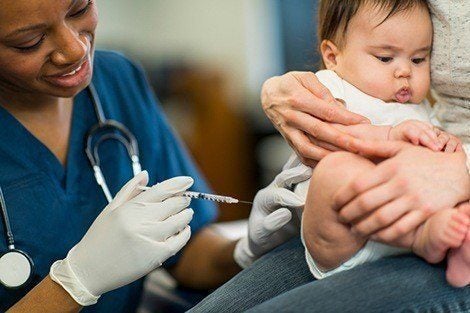New report recommends compensating providers for vaccine counseling
March 12, 2015 — The recent measles outbreak that spread through 17 states brought the issue of childhood vaccination into the headlines, leaving some with the impression that a growing movement of parents is questioning this cornerstone of public health. But there is good news, said K. “Vish” Viswanath, professor of health communication at Harvard T.H. Chan School of Public Health. As chair of a working group charged by the U.S. Department of Health and Human Services (HHS) to look into national vaccine confidence, he found that the overwhelming majority of parents (80%-90%) are vaccinating their children on the physician-recommended schedule. The group will release recommendations for further boosting vaccination rates — and confidence in their safety — to HHS in July. Key among them: spreading the message that vaccination is the norm.
“Parents who do vaccinate their children want to be supported,” Viswanath said. “Some have questions and doubts that they want to have clarified. They care for their children, and when they hear on the news that other parents are declining or delaying vaccinations, they wonder if they are making the right decision.”
Howard Koh, professor of the practice of public health leadership, convened the vaccine confidence working group, which is part of HHS’s National Vaccine Advisory Committee, in 2013 when he was then serving as Assistant Secretary for Health for HHS.
The working group’s draft report will be released for public comment later this spring.
“Parents want to be actively involved in the decision to vaccinate their children. ‘Routine immunization’ may not feel routine to them,” Koh said. “Providers can continue to have respectful and informed conversations with parents, stressing that vaccination is a key goal.”
Viswanath and his colleagues found that with infectious diseases largely invisible, today’s parents are more likely to feel confident in vaccines’ safety and efficacy if they believe that other parents in their communities are vaccinating their children, and if they have a trusting relationship with their health care providers. While a very small number of parents decline vaccines for ideological reasons, the majority of hesitant parents want to discuss vaccines with their providers, Viswanath said. They may want more information about how vaccines work, or to discuss information they read on social media claiming that vaccines are harmful. These discussions take time. And if the parents chose not to vaccinate during the visit, the provider won’t get paid.
Recognizing the importance of these conversations, Viswanath and colleagues recommend creating billing codes for vaccine counseling. In addition to compensating providers for their time, the hope is that these conversations will foster positive relationships with parents and lead to vaccination in the future.
Viswanath hopes that the working group’s recommendations will help contribute to a “teachable moment” on under-vaccination provided by the current measles outbreak. There have been 173 cases reported this year as of early March, with most cases stemming from an outbreak started at Disneyland in California. Although the disease is no longer endemic in the U.S. — it was declared “eliminated” in 2000 — it remains common in other parts of the world. And, as shown by the Disneyland outbreak, an infected traveler can quickly spread the disease among people who are not vaccinated.
“Children too young to be vaccinated, as well as children who cannot be vaccinated because of health conditions, depend on high levels of vaccination coverage for protection against infectious diseases like measles,” the report states. “Immunity is often silent or invisible until it is tested — and measles is one of the most sensitive ‘stress tests’ we have.”
The report cited the need to improve communication with the small number of parents — often clustered around particular communities or schools — who remain deeply mistrustful of vaccine safety.
“Calling them anti-vaxxers is not helpful,” Viswanath said. “Trying to persuade them that they are wrong is only going to reinforce their attitudes. With them, you have to explore other ways of reaching out and explaining why this process is safe. But you can’t let false claims go uncontested.”
“I would never give up on working to improve parents’ trust in vaccines,” Koh said. “It’s too important for public health.”
